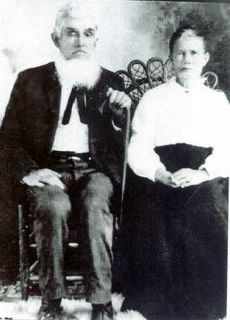
Weddles
The following is a true story of my great great grandparents, William Henry Weddle and Mary Elizabeth Chapman Weddle. Thankfully, somewhere along the line, a relative saw fit to record bits of our family lore.
William Henry was born in 1836 and died in 1922. Mary Elizabeth was born 1843 and died in 1929. They were married in 1861, in Barton County, Missouri. These are the statistics. But what happened in between all these dates comprises a family history.
Missouri during the Civil War was a fearful place. Full of hate and violence. It was a "border state" with strong sentiments on both sides of the slavery issue. Bad men came, the likes of renegade raider William C.Quantrell, leader of the despicable Missouri guerrillas. Using the war as a cover, they raided the coutryside, raping and murdering. During this frightening time, my grandfather Weddle joined the Confederacy. Company B, Burns Missouri Regiment of Infantry, Parsons Brigade is listed on his Application of Indigent Soldier of the late Confederacy for pension under the act of May 12, 1899.
The Weddle household consisted of Henry, Mary Elizabeth, Billy (Henry's son from a previous and now deceased wife), George Beasley (son of Mary Elizabeth before her marriage to Henry), and their own son, Jimmy. Mary's parents lived nearby and owned two slaves - a husband and wife. Henry left for war and the two families combined for safety from the "bushwackers". The family made several precautions to protect themselves from these marauders. Hiding her horse, and hoarding hidden food became part of the daily routine. Because it grew too dangerous for her father to remain in the house ( bushwackers would murder any men in the house when they came raiding, and both Union and Confederate armies would "enlist" any male that could walk and carry a gun), Mary moved her father to a big cave that was in the side of a mountain about a mile from the house. But it was to no avail, the poor man was found by a band of raiders and shot down in front of the little family. The men took anything and everything of value in the house then set it afire. Mary begged one of the men to spare her little boys some cornmeal, which for some odd reason was granted. After the bandits left, Mary went in search of a neighbor to help bury her father. Now it was on Mary's shoulders to make hard decisions. Upon an invitation from another neighbor, Mary began to make plans to join a wagon train headed to Texas. There were twenty-three wagons of women and children. Before the journey, Mary dug up the dirt from the smokehouse floor, poured water over it, then boiled it down to make salt. On the trail, Mary provided for her little family as best she could. Once she found a wild pig with a litter of piglets, and managed to steal one away from the old sow. Another time, she found leftover corn in a deserted corn crib. A pumpkin patch provided stewed pumpkin for a time. Nothing was easy, and the women had to keep the wagons rolling. It was necessary to grease the axels to keep them from catching fire, and pine knots were gathered and burned down to a usable tar-like substance. Occasionally, a farm that was passed on the trail would provide a meager meal with whatever they could spare. After a time, there were only three wagons left in the little train headed for the Red River. Some had stopped along the way with a wagon that just wouldn't go any further, some took a different route. Mary's wagon crossed the Red River without much difficulty - they were in Texas!
Then, the unbelievable happened. One evening the little family was huddled underneath a tree, waiting out a rainshower. Two Confederate soldiers rode up and joined them under the branches. They talked a bit with Mary and heard of her journey. Billy, Henry's first son, was hairlipped at birth, but he could speak tolerably well. One of the men noticed the little boy and asked about his name. As it turned out, Henry was just a few miles away, hauling food for the Confederate army at a supply depot. Henry, like most of the men who were sorely missing wives and children, sat around the fire at night and chased away the homesickness with stories of life before the war. He told of Billy, and his dog-it-all spirit to not let the ugly handicap slow him down. The two soldiers said they would tell Henry where to find Mary and the boys. Mary met Henry the next day, riding a mule along the trail. He had been wounded a few months back and had been assigned to drive a supply wagon to and from the front. Henry knew of a small deserted little house along his supply route and moved his family there. Since Henry was able to stay at the depot for the remainder of the war, he could bring them food, and have a semblance of family life.
This story, in a much longer version, has been handed down in our Weddle family since Mary first regaled grandchildren with her real-life history lessons. I have been lucky because some family member saw fit to be sure these and other stories were written down for the generations to come.
Because of Granddad Weddle, I am told that I could join the United Daughters of the Confederacy. I might just do that one day, to honor Henry and all of my other grandfathers, uncles, and cousins who played their part in the "War of Northern Aggression". And I hope that a little bit of Mary Elizabeth lives on in me, my daughters and granddaughters to come. I will be sure they know about this brave young lady who was so slight of build, but towering with determination and spirit.
